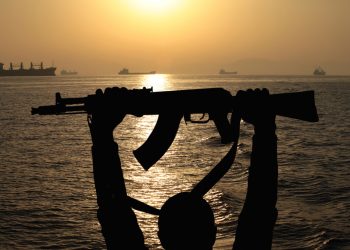A gang involved in the lucrative black market for stolen fuel appears to be the main culprit
 A surge in pirate attacks off West Africa has led to mounting concern in the shipping industry, and analysts say a gang involved in the lucrative black market for stolen fuel appears to be the main culprit.
A surge in pirate attacks off West Africa has led to mounting concern in the shipping industry, and analysts say a gang involved in the lucrative black market for stolen fuel appears to be the main culprit.
The increase in attacks in recent months has been concentrated along the Gulf of Guinea off the coast of the small nation of Benin, which neighbours Nigeria, Africa’s largest oil producer and where piracy has long been a problem.
Unlike the explosion of piracy off the coast of Somalia on the opposite end of the continent in recent years, those involved in the recent West African attacks have so far not appeared to be after ransom payments.
Two independent analysts said a relatively organised gang from Nigeria seems to be the prime suspect in the attacks, which have included pirates hijacking tankers and ordering them elsewhere to offload fuel to be sold on the black market.
Other types of attacks have occurred as well off Benin, such as armed robberies where criminals board ships and make off with whatever they can.
Fifteen piracy incidents off Benin have been reported so far this year to the International Maritime Bureau. None were reported last year.
“It’s almost certainly Nigerian pirates that are responsible for the attacks,” said Peter Sharwood-Smith, Nigeria country manager for risk management consultancy Drum Cussac and who has closely followed the situation off Benin.
“This is piracy on a fairly organised scale, where they’re targeting oil tankers and the like and they’re stealing the fuel.”
While it cannot be known for sure whether one gang has been responsible for the increase in attacks, that seems to be the case based on the pattern involved, he said. Bergen Risk Solutions, a Norway-based consultancy, came to a similar conclusion in a recent report.
“Our investigations indicate that the organised group responsible is based in Nigeria and has high-level patronage in that country,” it said, with prominent Nigerians having often been accused of involvement in the lucrative black market for oil and fuel.
The report said the group had until May specifically targeted vessels to steal petroleum products, but appears to have expanded more recently with robberies, with the possible involvement of local criminals from Benin.
Tankers targeted in recent weeks include Italian, Greek and Swedish vessels.
Crew members have been beaten and the pirates tend to be heavily armed, analysts say. According to information gathered by Bergen, a crew member was reported missing after a May attack off Benin and his body was found several days later.
The pirates often zero in on vessels anchored outside the Benin port, said Michael Howlett, deputy director of the International Maritime Bureau.
In the case of fuel cargo being stolen, “it is organised because you have to have the system in place to receive this tanker,” he said. For those unfamiliar with the region’s black market for oil and fuel, the scale of such theft may seem eye-popping.
The pirates are said to order the ships they hijack to other locations, where a portion of the fuel being transported as cargo is transferred to a separate vessel.
“There’s a big black market for fuel, so it could be sold anywhere,” Sharwood-Smith said. Bergen says the stolen cargo has been sold in “several West African ports, possibly including Abidjan in Cote d’Ivoire and Port Gentil in Gabon.”
Its report says the gang appears Nigerian in part because of the direction the criminals tend to travel in when leaving the vessels.
But determining why the surge has occurred off Benin and why now is difficult. There does not appear to have been a corresponding decline in incidents in Nigeria.
According to the IMB, six incidents were reported for the first half of this year in Nigeria, the same as in 2010, though analysts warn that attacks off Nigeria tend to be severely underreported.
Nigerian navy spokesman Kabir Aliyu speculated that the pirates may have moved on to neighbouring Benin due to increased security by his country, but he could provide no figures. He said he had no information on whether the gang responsible for the Benin attacks was Nigerian.
The commander of Benin’s navy could not be reached for comment. Explanations include Benin’s proximity to Nigeria, lower levels of security off the smaller country’s port and the gang simply finding a location where quick and easy money can be made. “It could be that Benin is viewed as a softer touch,” said the IMB’s Howlett.
Source: AFP





























































